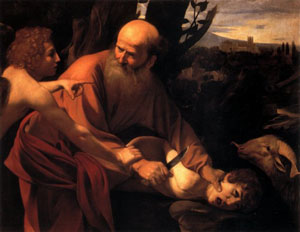 Abraham's trek to the lonely height of Mount Moriah took three days; for three days an ass jostled there, carrying Abraham and his long-wished for, unconditionally loved son. The journey would end in the father's sacrificing Isaac. What if Abraham had resigned himself to the loss, to living the rest of his life having used his own hands to saw through Isaac's throat? And, worse still, what if, having accepted and prepared himself to perform that horrific act, what if God called it off, and let Abraham keep Isaac?
Abraham's trek to the lonely height of Mount Moriah took three days; for three days an ass jostled there, carrying Abraham and his long-wished for, unconditionally loved son. The journey would end in the father's sacrificing Isaac. What if Abraham had resigned himself to the loss, to living the rest of his life having used his own hands to saw through Isaac's throat? And, worse still, what if, having accepted and prepared himself to perform that horrific act, what if God called it off, and let Abraham keep Isaac?
Abraham would be forced to live with the child he had already sought to kill.
The amazing thing--where faith is found--is not in the fact that Abraham was willing to sacrifice his son; no, it was Abraham's knowing that he would not lose Isaac, no matter what happened on Moriah.
Through faith I don't renounce anything, on the contrary in faith I receive everything ... It takes a purely human courage to renounce the whole of temporality in order to win eternity ... Through faith Abraham did not renounce his claim on Isaac, through his faith he received Isaac.
Kierkegaard believed his contemporaries took faith for granted. In Fear and Trembling, he tries to better understand faith by examining the Biblical story of God calling Abraham to sacrifice Isaac. This is a brief dialectic that problematizes and praises faith.
 Abraham, a favorite of God, was an old man before he finally had a child. Through Isaac, his first born son, Abraham was to populate the nations. But God called on Abraham to sacrifice Isaac on Mount Moriah. Abraham prepared his belongings and took his son Isaac on a three-day journey there to do as God asked. Isaac asked why his father was not bringing a lamb to the sacrifice and Abraham answered that God would provide. Upon reaching Moriah, Abraham binds Isaac and draws the knife. At the last minute, Abraham is told by an angel not to follow through with the sacrifice. Ultimately a ram caught up in some nearby bushes serves as the sacrifice.
Abraham, a favorite of God, was an old man before he finally had a child. Through Isaac, his first born son, Abraham was to populate the nations. But God called on Abraham to sacrifice Isaac on Mount Moriah. Abraham prepared his belongings and took his son Isaac on a three-day journey there to do as God asked. Isaac asked why his father was not bringing a lamb to the sacrifice and Abraham answered that God would provide. Upon reaching Moriah, Abraham binds Isaac and draws the knife. At the last minute, Abraham is told by an angel not to follow through with the sacrifice. Ultimately a ram caught up in some nearby bushes serves as the sacrifice.
How could Abraham live with himself? How could he ever look at Isaac again, knowing he had been a moment away from killing him? Why would God ask this of his favorite, Abraham? It's a troubling story to say the least. But Kierkegaard unfolds it carefully, and convincingly makes the case that this is a paradoxical story of heroism, not depravity.
 Abraham's trek to the lonely height of Mount Moriah took three days; for three days an ass jostled there, carrying Abraham and his long-wished for, unconditionally loved son. The journey would end in the father's sacrificing Isaac. What if Abraham had resigned himself to the loss, to living the rest of his life having used his own hands to saw through Isaac's throat? And, worse still, what if, having accepted and prepared himself to perform that horrific act, what if God called it off, and let Abraham keep Isaac?
Abraham's trek to the lonely height of Mount Moriah took three days; for three days an ass jostled there, carrying Abraham and his long-wished for, unconditionally loved son. The journey would end in the father's sacrificing Isaac. What if Abraham had resigned himself to the loss, to living the rest of his life having used his own hands to saw through Isaac's throat? And, worse still, what if, having accepted and prepared himself to perform that horrific act, what if God called it off, and let Abraham keep Isaac?